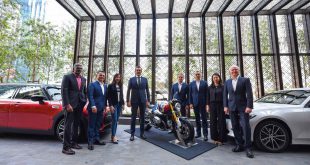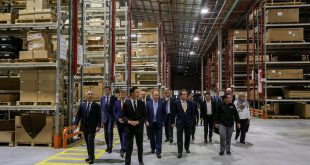Before the announcement of Budget 2013 in Malaysia, we received some comments (a.k.a wishlists) from many industry players. In this article from Dr. Gerhard Pils, Managing Director of BMW Group Malaysia, the German automaker would like to see a continued emphasis on the positive steps towards encouraging the uptake of advanced environmentally friendly technology in the automotive industry which continues to provide significant economic opportunities for both local as well as international automotive companies present in Malaysia.
Do you think we have a good chance of getting a cheaper BMW 320d or 520d?
The on-going initiatives by the government such as with the mandatory adoption of bio-diesel has served to galvanise the industry towards appreciating the value and worth of diesel fuel alternatives and should be rapidly followed by a legislative framework which will see the nation’s adoption of the internationally recognised Euro IV specification for fuel in the immediate future. Such a move would ensure that Malaysia is compliant with world standards while providing citizens with the additional benefits of having better fuel consumption, a much lowered overall costs of vehicle ownership as well as lower emission of greenhouse gases such as carbon dioxide (CO2) into our environment.
As the world’s automotive industry is at the tipping point of change in terms of technology, Malaysia is at the forefront of capitalising on newfound opportunities with a concentrated emphasis on advanced ecologically friendly vehicles where we now have the opportunity of becoming a regional hub for the development and manufacture of energy efficient vehicles and components.
While the Malaysian government has already begun to provide import and excise duties exemptions for Electric as well as Hybrid vehicles, the framework of the existing policies remains restrictive as they are limited to vehicles with engines below 2.0-litre engine capacity. BMW believe that for the full benefits of new and green technologies to be fully appreciated and adopted, the exemptions need to be extended to all vehicles that utilise such technologies regardless of engine size but with efficiency and emission figures as its main criteria. This will encourage early adoption by all consumer segments, as well as the entire automotive industry itself.
Furthermore, the Malaysian government should also look towards expanding its definition of Advanced Green Technology to also encompass existing Advanced Petrol and Advanced Diesel technologies which have come a considerable way in reducing emission standards.
The fleet of BMW Advanced Diesel vehicles, which have been available in Malaysia since 2009 are capable of providing reductions in fuel consumption of up to 25% with the ability of travelling up to 1000km on a single tank of fuel. For the layman, this means that for every five days of travel, the fifth day can be considered free of fuel costs when compared to its petrol engine counterpart. Most importantly, Advanced Diesel alternatives are now able to match even hybrid vehicles in terms of emission standards.
Whilst these vehicles do not enjoy the government’s duty exemption benefits outlined in last year’s budget compared to their Hybrid Technology counterparts, we hope that Advanced Diesel technologies would be included in the revision of the National Automotive Policy as the technology has more than proven its worth to be efficient. At the current moment, Advanced Diesel technology is also proven to be the most immediate solution to the rising fuel costs for the automotive industry.
Nevertheless, BMW Group Malaysia is undeterred in its commitment to introducing the full range of its Advanced Green Technology vehicles to Malaysian consumers and the next phase of the BMW EfficientDynamics strategy will begin with the market introduction of the new BMW ActiveHybrid 3 and BMW ActiveHybrid 5. These new models offer excellent driving economy in both urban as well as non-urban driving conditions and will provide Malaysian customers with the most advanced Hybrid technology currently available.
On a final note, the Malaysian government’s current deliberations regarding the reduction or removal of excise duties is highly welcomed by BMW as it encourages a more competitive playing field which in turn will provide tremendous benefits to consumers, automakers as well as the general economy. However, it is imperative that the government approaches the planning and execution of such a change in policy with transparency, clarity and foresight to not cause disruption to the current growth that the industry has been experiencing over the last few years.
With the Malaysian automotive segment well on the road to recovery following the challenging economic conditions of the previous years, this is to ensure that businesses throughout the automotive industry supply chain are given the opportunity to make the appropriate preparations ahead of such a major transition and do not in turn become victim to speculative tendencies in the market which could result in a severe and negative blow to our re-emerging industry.
 FastMotoring Motor News In Speed
FastMotoring Motor News In Speed





